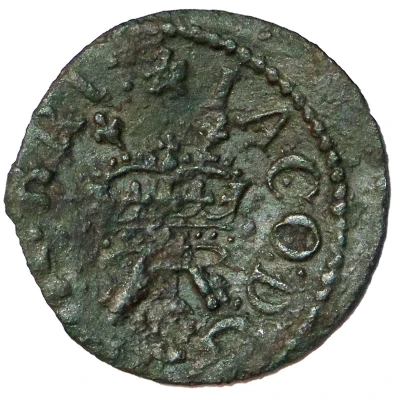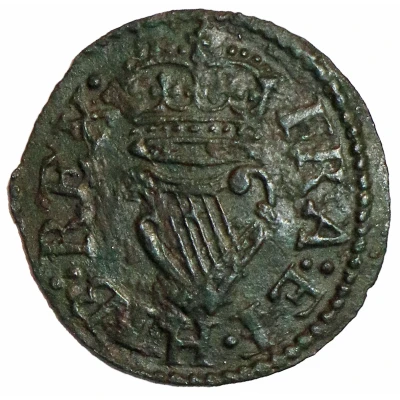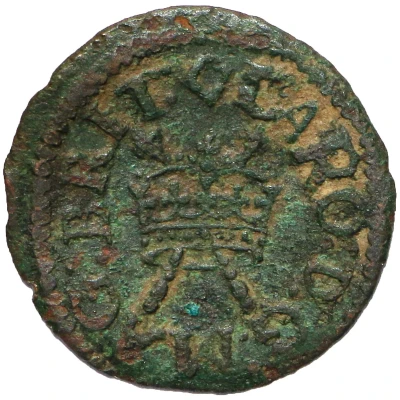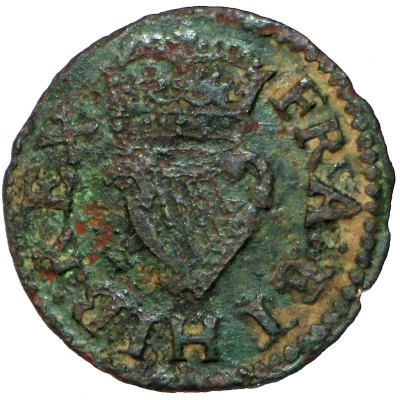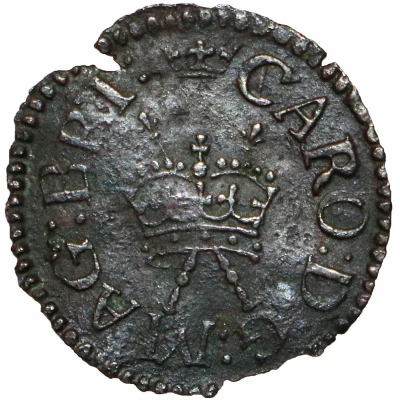
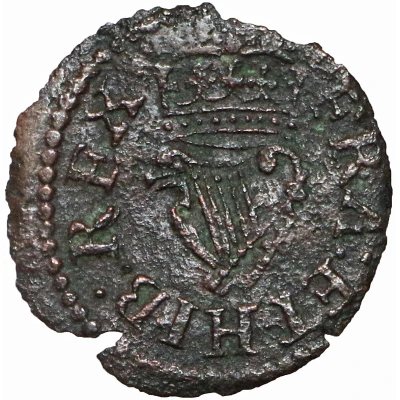

© John Conduitt (CC BY-SA)
1 Farthing - Charles I Richmond issue; type 1a ND
1625 year| Copper | 0.39 g | 16 mm |
| Issuer | England (United Kingdom, British Overseas Territories and Crown Dependencies) |
|---|---|
| King | Charles I (1625-1649) |
| Type | Token |
| Year | 1625 |
| Value | 1 Farthing (1⁄960) |
| Currency | Pound sterling (1158-1970) |
| Composition | Copper |
| Weight | 0.39 g |
| Diameter | 16 mm |
| Shape | Round (irregular) |
| Technique | Roller milled |
| Orientation | Coin alignment ↑↓ |
| Demonetized | Yes |
| Updated | 2024-10-08 |
| Numista | N#358575 |
|---|---|
| Rarity index | 94% |
Reverse
Eagle-headed, 5-string harp below single-arch crown with 9 jewels, legend around with colon stops.
Script: Latin
Lettering: FRA: ET(.) HIB: REX
Unabridged legend: Franciae Et Hiberniae Rex
Translation: King of France and Ireland
Comment
House of Stuart (1603-49), Charles I (1625-49). Everson Richmond Type 1a; Peck Richmond Type 1a.The distinguishing feature of Type 1 is that CARO (for Charles I) has been carved over IACO (for James I). Type 1a is based on the Lennox Type 3 and 4 with 5 jewels on the band of the crown on the obverse and 9 on the reverse.
There are two privy marks: coronet (die axis 6h) and crescent with mullet (die axis 12h). A variant with privy mark coronet has a 6-string, hook-fronted harp and die axis 12h.
There are 4 obverse legends, which differ by the spelling and punctuation of the last word. All with privy mark coronet are Obverse 3:
1) BRIT:
2) BRIT
3) BRI:
4) BRI
There are 2 reverse legends, which differ by the punctuation after ET. All with privy mark crescent with mullet are Reverse 1:
1) ET
2) ET.
In 1623, towards the end of the reign of James I, Ludovic, Duke of Lennox, acquired the additional title of the Duke of Richmond but died a few months later without an heir. The farthing patent passed to his widow, Frances Stewart, Dowager Duchess of Richmond and Lennox, who had as partner in it, Sir Francis Crane. This patent was confirmed to them on 30th May, 1625, by Charles I upon his accession. Thus, the first ‘farthing’ issues of Charles I are consequently called Richmonds.
Interesting fact
One interesting fact about the Token 1 Farthing - Charles I (Richmond issue; type 1a) ND (1625) from England (United Kingdom, British Overseas Territories and Crown Dependencies) made of Copper weighing 0.39 g is that it was issued during a time of great economic turmoil in England. The coin was minted in 1625, during the reign of King Charles I, when the country was facing a severe shortage of small change, which was essential for everyday transactions. To address this issue, the government issued a series of copper tokens, including the 1 Farthing coin, which was worth one-fourth of a penny. Despite its small value, the coin played a significant role in the economy of the time and remains a valuable collector's item today.
